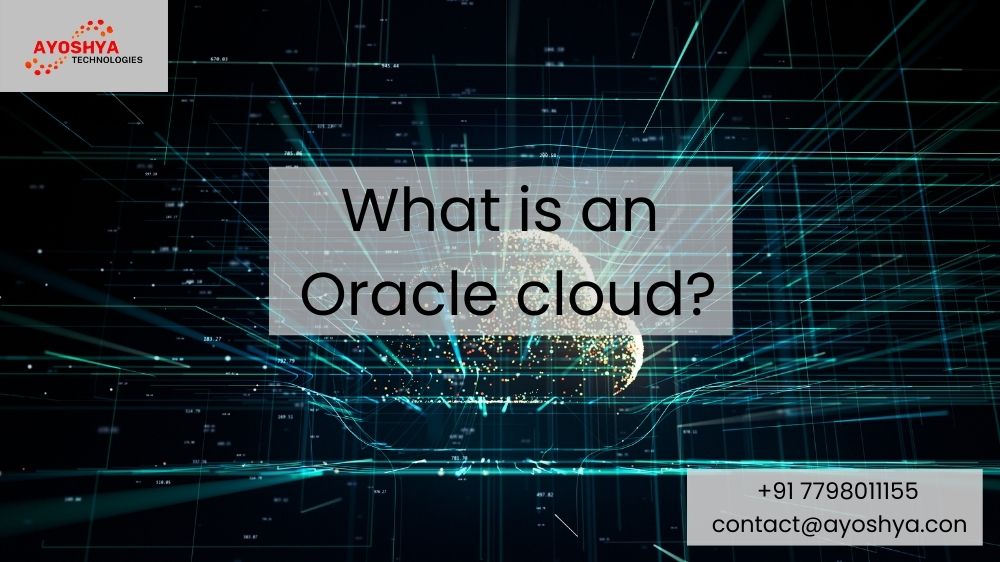What is an Oracle Cloud?
Oracle has remained a major vendor of enterprise IT databases for the past 40 years. It was the third-largest software company and ranked no. 82 in the Fortune 500 listings of US companies by total revenue in 2018. In addition to selling technology, it offers cloud services to companies. Its cloud architecture acts as the essential building block and offers a wide range of processing options, reliable storage, speedy networking, AI-driven analytics, and robust security. The development of the Oracle cloud, which has brought a new level of integration, has allowed employees to focus on useful work.
Through a global network of managed data centers, Oracle Cloud, a cloud computing service offered by Oracle Corporation, provides storage, servers, applications, networks, and services.
Oracle Cloud provides Data as a Service (DaaS), Infrastructure as a Service (IaaS), Software as a Service (SaaS), and Platform as a Service to enable the development, integration, deployment, and expansion of cloud-based applications (PaaS).
On this platform, a wide number of databases, programming languages, tools, and frameworks are supported in addition to Oracle-specific, open-source, and outside software and systems. SaaS, IaaS, DaaS, and PaaS are the four basic subcategories of cloud computing.
Let’s clarify the foundations first.
Software Services (SaaS)(What is Oracle Cloud)
Customers access programs and releases hosted online by other parties using the Software as a Service (SaaS) method of software distribution.
Key characteristics:
- Users are not required to upgrade, install, or even monitor software because SaaS providers handle all software administration.
- High data security in the cloud; equipment failure does not result in data loss.
- Resources can simply be scaled based on the needs of the service.
- Practically any device with an internet connection can be used to access the programs.
Platforms That Use Services (PaaS)(What is Oracle Cloud?)
Platform as a Service provides a platform for the creation, distribution, and use of applications without the trouble of setting up and maintaining the infrastructure, such as servers, storage, networks, or operating systems. It does, however, have control over the configurations for both the deployed apps and the application hosting environment.
Key features: The main advantages of PaaS include speeding up provisioning, improving scalability, increasing automation, standardizing deployments, and eliminating repetitive tasks.
- This includes integration of IaaS services.
- There are disruption and security risks.
- really approachable
- minimizes downtime and data loss.
- assures a speedy recovery.
- It enables quick scaling.
- an improvement in the developer’s productivity and standards.
- Users can easily navigate the coding environment.
Services for Infrastructure (IaaS)(What is Oracle Cloud)
Oracle Cloud Infrastructure’s Infrastructure as a Service (IaaS) offers high-performance computing and storage capacity in a scalable overlay virtual network that is only accessible from your on-premises network.
Key characteristics:
Computing: We can satisfy various workloads and performance requirements thanks to the company’s virtual machine instances. In addition, they offer the ability to scale up and down without a hypervisor, as well as bare metal servers, bare metal GPU servers, and other services.
Block volumes, object storage, and archive storage are all available on the platform, along with the ability to enable database, analytics, content, and other applications using common protocols and APIs.
To support new or existing private networks with end-to-end encryption, a network with completely programmable IP addresses, subnets, routing, and firewalls is needed.
Information Services (DaaS)
This system is known as the Oracle Data Cloud (ODC). It analyzes and gathers customer data from many channels and devices under Oracle ID Graph control in order to produce cross-channel consumer understanding. Oracle’s Data as a Service (DaaS) gives you access to more than 300 million corporate data and 100 million contact records internationally, giving you the most recent, accurate information.
With Daas, also known as Social Data and Insight, you can carry out the following actions:
You can keep your company and contact information up to date by comparing and updating existing corporate data and contact records across all of your applications.
You can accomplish your business objectives by enhancing and comparing your company’s contact data with external reference data.
To improve the data’s integrity, accuracy, and completeness for better prospecting,
The following are a few benefits:
Through a shared infrastructure, Oracle streamlines performance and automates the bulk of the tasks, saving money on hardware expenses, enhancing business flexibility, and delivering enhanced productivity over the short and long term. In order to satisfy demand, it makes it easier for businesses to function more swiftly.
It provides a hassle-free, future-proof solution for moving your old workload to modern platforms, and it is easy to use. It provides a rapid method for migrating applications to the cloud, such as your ERP, analytics software, and even your current architecture. It provides support for your business as well as scalable infrastructure, software, and hardware solutions.



